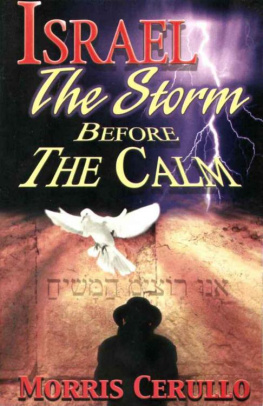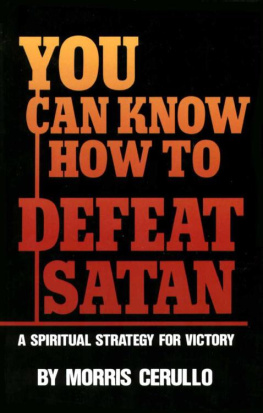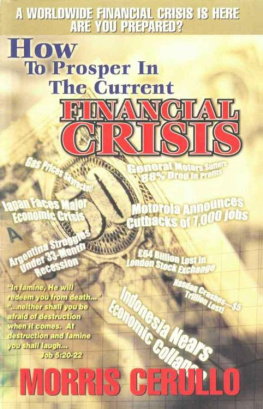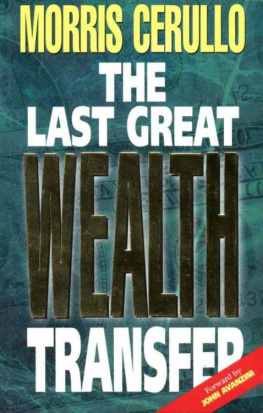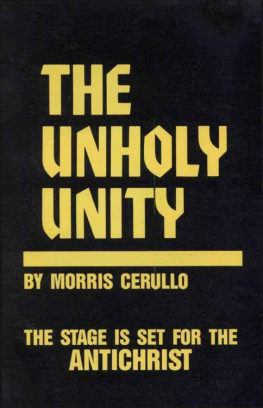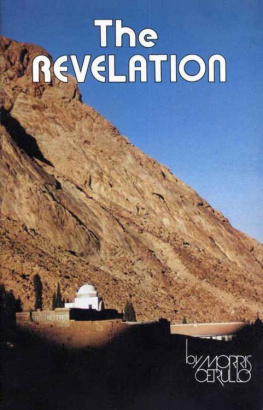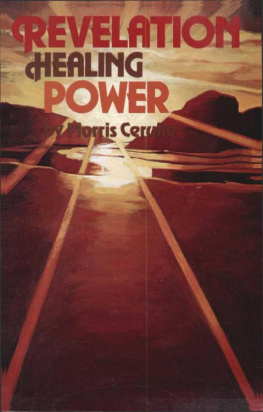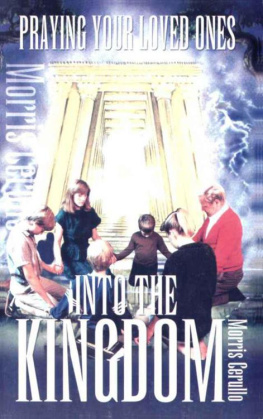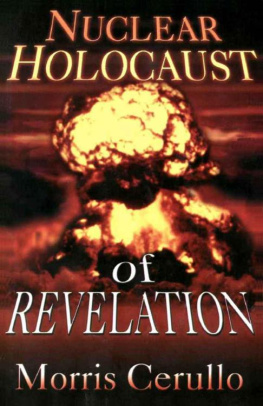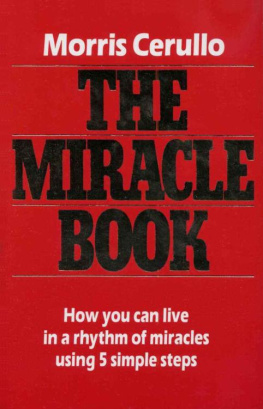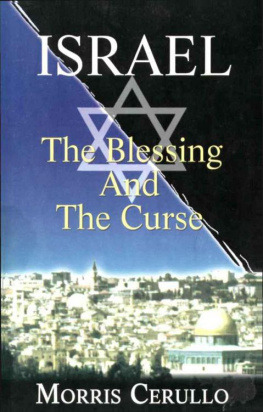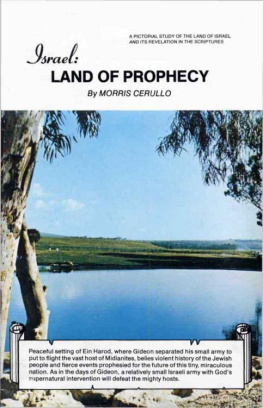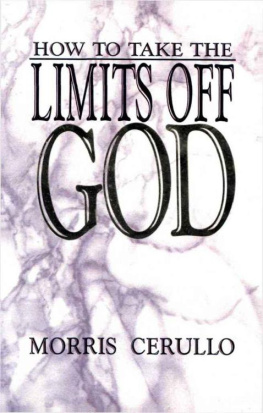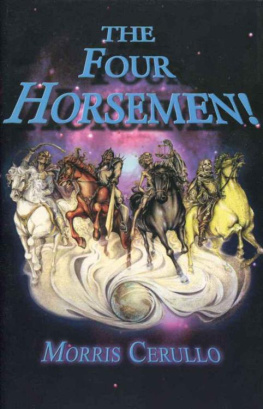Morris Cerullo - Israel : the storm before the calm
Here you can read online Morris Cerullo - Israel : the storm before the calm full text of the book (entire story) in english for free. Download pdf and epub, get meaning, cover and reviews about this ebook. City: San Diego, year: 2002, publisher: Morris Cerullo World Evangelism, genre: Politics. Description of the work, (preface) as well as reviews are available. Best literature library LitArk.com created for fans of good reading and offers a wide selection of genres:
Romance novel
Science fiction
Adventure
Detective
Science
History
Home and family
Prose
Art
Politics
Computer
Non-fiction
Religion
Business
Children
Humor
Choose a favorite category and find really read worthwhile books. Enjoy immersion in the world of imagination, feel the emotions of the characters or learn something new for yourself, make an fascinating discovery.
- Book:Israel : the storm before the calm
- Author:
- Publisher:Morris Cerullo World Evangelism
- Genre:
- Year:2002
- City:San Diego
- Rating:5 / 5
- Favourites:Add to favourites
- Your mark:
- 100
- 1
- 2
- 3
- 4
- 5
Israel : the storm before the calm: summary, description and annotation
We offer to read an annotation, description, summary or preface (depends on what the author of the book "Israel : the storm before the calm" wrote himself). If you haven't found the necessary information about the book — write in the comments, we will try to find it.
Israel : the storm before the calm — read online for free the complete book (whole text) full work
Below is the text of the book, divided by pages. System saving the place of the last page read, allows you to conveniently read the book "Israel : the storm before the calm" online for free, without having to search again every time where you left off. Put a bookmark, and you can go to the page where you finished reading at any time.
Font size:
Interval:
Bookmark:
Israel: The Storm Before The Calm
Table of Contents
Chapter 1
A Planned Insurrection
In the year 2000, a period of relative peace in the region of Israel exploded into a war of violence unlike any that had happened in years.
To date, hundreds of people have been killed, and thousands more have been injured both physically and emotionally by suicide bombers, shootings of civilians and other violence that occurs almost daily.
The violence all started when Israel's controversial former General Ariel Sharon, made a visit to the Temple Mount in Jerusalem on September 28, 2000.
Sharon is deeply hated and mistrusted by the Palestinians in Israel for many reasons. The 74-year-old was long a general in the Israeli army, responsible for many overwhelming Israeli victories.
Much of Israel's awesome military machine can be attributed to Sharon and his skill as a general and a leader.
Sharon has been a controversial figure in Israeli politics for decades. In 1971, he ordered a crackdown on Palestinian terrorists in Gaza for which he is still reviled to this day. First elected to the Knesset in 1977, Sharon was defense minister during the June 1982 Israeli invasion of Lebanon. An Israeli tribunal found Sharon indirectly responsible for the September 1982 massacre by Lebanese militias of thousands of Palestinian and Lebanese civilians living in the Sabra and Shatila refugee camps. As a result, Sharon was removed as defense minister but retained a role in the Cabinet as "minister without portfolio."
His fierce love for the nation of Israel and steely resolve against surrendering Jerusalem, which he considers the rightful, eternal capital of the nation of Israel, has made Sharon even more unpopular among those who would like to see a Palestinian state established with Jerusalem as its capital.
Since 1987, Sharon has maintained a heavily guarded residence, draped in an Israeli flag, in the Muslim Quarter of Jerusalem's Old City, further upsetting the Palestinians.
In the early 1990s, while serving as housing minister, he promoted a massive construction drive to increase Israeli settlement in the occupied West Bank and Gaza Strip.
Sharon was a vociferous critic of Prime Minister Ehud Barak. But it was his visit to al- Haram al-Sharif on September 28, 2000, that touched off the current Palestinian civil war.
When Barak resigned and called for new prime ministerial elections, Sharon won with 60 percent of the vote.
But the unreported fact of the matter is that the Palestinians were not "shocked and appalled" by Sharon's presence on the Temple Mount. In fact, since the Israelis have given the Palestinian Authority de facto control over the Temple Mount, Sharon was required toand didregister his visit with the Palestinian Authority, which gladly gave him permission to be there.
The Palestinian Authority controls the Temple Mount because, as a result of the Oslo Accord, Israel gave up day-today control over portions of Palestinian areas, including the Temple Mount, instead delegating daily administration of those areas to the Palestinian Authority.
Though Israel largely retains ultimate say over those areas, it is a hands-off control; Palestinians have essentially free reign in those areas.
So when Sharon visited the area, the world saw a shocked Palestinian Authority, who displayed horror at the idea that such a "warmonger" would dare visit such a holy place.
The global media, largely sympathetic with the Palestinian Authority and especially media darling Palestinian leader Yasser Arafat, breathlessly covered the horrified Palestinians as they expressed outrage over Sharon's presence.
What the media did not cover, however, was that the Palestinians themselves had given Sharon the OK to be there.
In other words, the outrage, the horror, the shock were all manufactured emotionshis presence there was no more shocking than the presence of the ancient mosque that adorns that mountain.
But the media and the Palestinian Authority did not let that fact stop them from whipping up the rank and file Palestinians into a furya murderous fury that has continued to this day through suicide bombings, armed uprisings and insurrections.
The media and the Palestinians were counting on one 'tragically reliable factthe residents of the world do not pay attention; they do not take the time to investigate any matter thoroughly unless it directly involves them.
Most of the world do not have time to thoroughly investigate the Israeli/Palestinian issue, so they rely on the media to be their eyes and ears in the regionand to explain what is going on and why.
But the media have continually shown themselves to be unreliable sources in the Middle East, obfuscating, telling halftruths and downright lying when they thought it necessary.
By careful choice of words, the media have also conspired there's no other word that adequately describes it, Partner to distance Palestinian terrorism from the United States' September 11, 2001, terrorism.
For instance, where the media call the September 11, 2001, hijackers "terrorists" without any reservation, suicide bombers in Israel who blow citizens up routinely are called "militants."
While Osama bin Laden's group is called a "terrorist organization," the extremist fringes of Palestinian insurrection are called "militia."
Some media outlets even call the Palestinian terrorists " Palestinian Nationalists."
Instead of "extremists," they're called "fundamentalists."
Instead of "mass murder," it's called a "suicide bombing" or worse, a "civilian attack."
When Palestinian officials spew anti-Semitism and vitriol, it's called "impassioned speech." When Israeli leaders speak of protecting their country, it's called "right-wing rhetoric."
Palestinian weapons are called "arms." Israeli weapons are called "war machine" or "war plane" or "high-powered sniper rifle."
Palestinian citiesespecially when Israeli troops are sent thereare called "refugee camps," as if thousands of people are sitting around in tents with mud floors, waiting to be returned to their homeland.
Do you see the subtle bias of words here? Which words make you less sympathetic? A "militant" seems much nicer than a terrorist.
A "militia" seems like something you could belong to on the weekend in the rural areas of your state, not a group of people who have no qualms about murdering innocent women and children to achieve their goals.
"War planes" sound like something that would be used by a big bully. " arms " sound like little pistols and rubber bands.
The rhetoric from the media is completely biased with a specific purpose. When Israel began a crackdown on terrorism, it was called the "Israeli invasion campaign," as if Israel had invaded territory it didn't already own.
All of the territory Israel moved its armed forces into, however, was territory it had already won in either The Six-Day Warwhere Israel was attacked by practically all of its neighborsor any of a number of subsequent wars.
In other words, the "Israeli invasion" was nothing of the sort.
When Israel cracked down on one of the world's most prolific terrorism factoriesthe city (not a "refugee camp," as ' the media would have you believe) of Jenin in the West Bank it was called by the media a "massacre."
Immediately, the Palestinians used that media bias to leverage themselves with an all-too-willing United Nations, calling for an investigation into "Israeli atrocities" in the city, where the world's most vicious terrorists have long originated.
Photos of destroyed buildings, crying mothers, dirty children and dejected men raced across the news wires with the speed of light, slapped onto news pages by sympathetic editors, rushed into the news cycle by television stations and decried by talking heads and professional pundits.
Font size:
Interval:
Bookmark:
Similar books «Israel : the storm before the calm»
Look at similar books to Israel : the storm before the calm. We have selected literature similar in name and meaning in the hope of providing readers with more options to find new, interesting, not yet read works.
Discussion, reviews of the book Israel : the storm before the calm and just readers' own opinions. Leave your comments, write what you think about the work, its meaning or the main characters. Specify what exactly you liked and what you didn't like, and why you think so.

